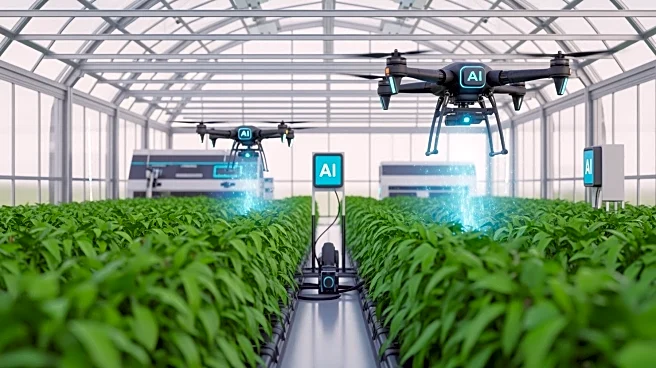What's Happening?
The smart oil crops market is experiencing significant growth, driven by the integration of precision farming technologies and artificial intelligence (AI). This market is responding to the global demand for sustainable and high-yield oilseeds, essential
for food and biofuel production. Governments worldwide are supporting this growth through initiatives aimed at enhancing productivity and reducing reliance on imported edible oils. In the U.S., the USDA projects an increase in oilseed production for the 2025/26 marketing year, with a shift from wheat to rapeseed cultivation. The adoption of smart farming tools, such as AI, IoT, and smart machinery, is accelerating, with technologies like smart tractors and autonomous planters gaining traction. These advancements are positioning the smart oil crops market as a key player in ensuring food security and reducing import dependency.
Why It's Important?
The growth of the smart oil crops market is crucial for addressing global challenges such as climate change, resource scarcity, and food security. By integrating advanced technologies, the market aims to optimize yield and resource use, which is vital for sustainable agriculture. The U.S. and other regions are investing in precision agriculture to enhance productivity and sustainability, which could lead to reduced environmental impact and increased economic resilience. Key players in the industry are focusing on innovations that improve crop management and resource utilization, which could benefit farmers by increasing yields and reducing costs. This market evolution is expected to have a significant impact on the agricultural sector, potentially transforming traditional farming practices and contributing to global food security.
What's Next?
The smart oil crops market is poised for further growth as more regions adopt precision farming technologies. The USDA's investment in precision agriculture and the development of new crop varieties are expected to drive this market forward. As more farmers adopt smart farming tools, the market could see increased efficiency and sustainability in oilseed production. Additionally, government initiatives and collaborations with organizations like the United Nations Development Programme (UNDP) are likely to support the market's expansion. The continued focus on innovation and technology integration will be crucial for maintaining the momentum of this market and achieving long-term sustainability goals.
Beyond the Headlines
The integration of AI and precision farming in the smart oil crops market raises important ethical and cultural considerations. The shift towards technology-driven agriculture may impact small-scale farmers who lack access to these innovations, potentially widening the gap between large and small agricultural operations. Additionally, the reliance on technology could lead to concerns about data privacy and the control of agricultural data. As the market evolves, addressing these issues will be essential to ensure equitable access to technology and the benefits it brings. The long-term success of the smart oil crops market will depend on balancing technological advancements with the needs and capabilities of diverse farming communities.














